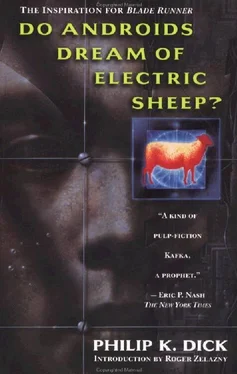“What happened?” Rick asked, chilled. The department’s chief bounty hunter had been all right yesterday; at the end of the day he had as usual zipped off in his hovercar to his apartment in the crowded high-prestige Nob Hill area of the City.
Bryant muttered over his shoulder something about nine-thirty in Dave’s office and departed, leaving Rick standing alone.
As he entered his own office Rick heard the voice of his secretary, Ann Marsten, behind him. “Mr. Deckard, you know what happened to Mr. Holden? He got shot.” She followed after him into the stuffy, closed-up office and set the air-filtering unit into motion.
“Yeah,” he responded absently.
“It must have been one of those new, extra-clever andys the Rosen Association is turning out,” Miss Marsten said. “Did you read over the company’s brochure and the spec sheets? The Nexus-6 brain unit they’re using now is capable of selecting within a field of two trillion constituents, or ten million separate neural pathways.” She lowered her voice. “You missed the vidcall this morning. Miss Wild told me; it came through the switchboard exactly at nine.”
“A call in?” Rick asked.
Miss Marsten said, “A call out by Mr. Bryant to the W.P.O. in Russia. Asking them if they would be willing to file a formal written complaint with the Rosen Association’s factory representative East.”
“Harry still wants the Nexus-6 brain unit withdrawn from the market?” He felt no surprise. Since the initial release of its specifications and performance charts back in August of 1991 most police agencies which dealt with escaped andys had been protesting. “The Soviet police can’t do any more than we can,” he said. Legally, the manufacturers of the Nexus-6 brain unit operated under colonial law, their parent auto-factory being on Mars. “We had better just accept the new unit as a fact of life,” he said. “It’s always been this way, with every improved brain unit that’s come along. I remember the howls of pain when the Sudermann people showed their old T-14 back in ‘89. Every police agency in the Western Hemisphere clamored that no test would detect its presence, in an instance of illegal entry here. As a matter of fact, for a while they were right.” Over fifty of the T-14 android as he recalled had made their way by one means or another to Earth, and had not been detected for a period in some cases up to an entire year. But then the Voigt Empathy Test had been devised by the Pavlov Institute working in the Soviet Union. And no T-14 android—insofar, at least, as was known —had managed to pass that particular test.
“Want to know what the Russian police said?” Miss Marsten asked. “I know that, too.” Her freckled, orange face glowed.
Rick said, “I’ll find out from Harry Bryant.” He felt irritable; office gossip annoyed him because it always proved better than the truth. Seating himself at his desk he pointedly fished about in a drawer until Miss Marsten, perceiving the hint, departed.
From the drawer he produced an ancient, creased manila envelope. Leaning back, tilting his important—style chair, he rummaged among the contents of the envelope until he came across what he wanted: the collected, extant data on the Nexus-6.
A moment’s reading vindicated Miss Marsten’s statement; the Nexus-6 did have two trillion constituents plus a choice within a range of ten million possible combinations of cerebral activity. In .45 of a second an android equipped with such a brain structure could assume any one of fourteen basic reaction-postures. Well, no intelligence test would trap such an andy. But then, intelligence tests hadn’t trapped an andy in years, not since the primordial, crude varieties of the ‘70s—
The Nexus-6 android types, Rick reflected, surpassed several classes of human specials in terms of intelligence. In other words, androids equipped with the new Nexus-6 brain unit had from a sort of rough, pragmatic, no-nonsense standpoint evolved beyond a major—but inferior—segment of mankind. For better or worse. The servant had in some cases become more adroit than its master. But new scales of achievement, for example the Voigt-Kampff Empathy Test, had emerged as criteria by which to judge. An android, no matter how gifted as to pure intellectual capacity, could make no sense out of the fusion which took place routinely among the followers of Mercerism—an experience which he, and virtually everyone else, including subnormal chickenheads, managed with no difficulty.
He had wondered as had most people at one time or another precisely why an android bounced helplessly about when confronted by an empathy-measuring test. Empathy, evidently, existed only within the human community, whereas intelligence to some degree could be found throughout every phylum and order including the arachnids. For one thing, the emphatic faculty probably required an unimpaired group instinct; a solitary organism, such as a spider, would have no use for it; in fact it would tend to abort a spider’s ability to survive. It would make him conscious of the desire to live on the part of his prey. Hence all predators, even highly developed mammals such as cats, would starve.
Empathy, he once had decided, must be limited to herbivores or anyhow omnivores who could depart from a meat diet. Because, ultimatley, the emphatic gift blurred the boundaries between hunter and victim, between the successful and the defeated. As in the fusion with Mercer, everyone ascended together or, when the cycle had come to an end, fell together into the trough of the tomb world. Oddly, it resembled a sort of biological insurance, but double-edged. As long as some creature experienced joy, then the condition for all other creatures included a fragment of joy. However, if any living being suffered, then for all the rest the shadow could not be entirely cast off. A herd animal such as man would acquire a higher survival factor through this; an owl or a cobra would be destroyed.
Evidently the humanoid robot constituted a solitary predator.
Rick liked to think of them that way; it made his job palatable. In retiring—i.e. killing—an andy he did not violate the rule of life laid down by Mercer. You shall kill only the kill ers , Mercer had told them the year empathy boxes first appeared on Earth. And in Mercerism, as it evolved into a full theology, the concept of The Killers had grown insidiously. In Mercerism, an absolute evil plucked at the threadbare cloak of the tottering, ascending old man, but it was never clear who or what this evil presence was. A Mercerite sensed evil without understanding it. Put another way, a Mercerite was free to locate the nebulous presence of The Killers wherever he saw fit. For Rick Deckard an escaped humanoid robot, which had killed its master, which had been equipped with an intelligence greater than that of many human beings, which had no regard for animals, which possessed no ability to feel emphatic joy for another life form’s success or grief at its defeat—that, for him, epitomized The Killers.
Thinking about animals reminded him of the ostrich he had seen in the pet store. Temporarily he pushed away the specs on the Nexus-6 brain unit, took a pinch of Mrs. Siddons’ No. 3 & 4 snuff and cogitated. Then he examined his watch, saw that he had time; he picked up his desk vidphone and said to Miss Marsten, “Get me the Happy Dog Pet Shop on Sutter Street.”
“Yes sir,” Miss Marsten said, and opened her phone book.
They can’t really want that much for the ostrich, Rick said to himself. They expect you to car-trade, like in the old days.
“Happy Dog Pet Shop,” a man’s voice declared, and on Rick’s vidscreen a minute happy face appeared. Animals could be heard bawling.
“That ostrich you have in your display window,” Rich said; he toyed with a ceramic ashtray before him on the desk. “What sort of a down payment would I need for that?”
Читать дальше








